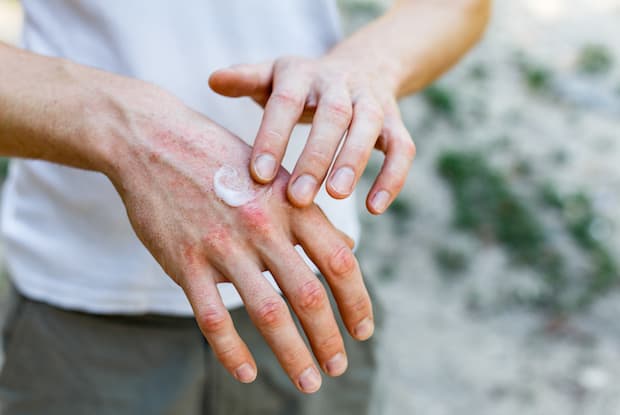Table of Contents
Understanding Eczema
Eczema is a condition that can be challenging for a person’s physical appearance as well as their mental state. Eczema’s red, rash can be uncomfortable and may interfere with a person’s daily life. There are several different eczema types, and they affect over 30 million people in the United States. Eczema is also known as atopic dermatitis, which refers to the most common type of eczema. Dermatitis is a word used to describe inflammation of the skin. [1]
This skin condition is triggered by the immune system’s response to certain irritants, including smoke, pollen, soaps, and fragrances. You are more likely to develop eczema if you have asthma or hay fever. Eczema typically begins in childhood, but some children outgrow this condition as they grow up. In other cases, eczema can become chronic and occur in flare-ups throughout a person’s life. Luckily, there are many medications like Elidel Cream and Neoral (cyclosporine) that can help with eczema symptoms. Those symptoms can include:
Get savings updates for Elidel Cream
There is a strong link between eczema and a person’s mental health. Those with eczema are more likely to experience anxiety or depression for several reasons. Read on to learn more about the link between eczema and mental health as well as methods to reduce anxiety.
More Than Itchy Skin
There are many scientific components behind the link between eczema and anxiety. Eczema occurs due to the immune system’s response to irritants. When we experience stressful situations, the fight or flight response is triggered in the body. These feelings produce stress hormones in the body (adrenaline and cortisol). When there is too much cortisol in the body, the immune system goes into overdrive and can create an inflammatory response in the skin. White blood cells then release histamine, which is a compound that causes itchiness. Those with eczema are more prone to this response.
Medications can help with eczema symptoms, but if your stress is not under control, then the negative mental effects of eczema may continue. If both the physical and mental aspects of eczema are not confronted, then a vicious cycle of anxiety and inflamed skin can feel impossible to beat. Medications, along with lifestyle changes, can help get your stress under control. [2]
Get Some Sleep!
According to a 2016 survey by the National Eczema Association, one-half of respondents reported poor sleep symptoms as well as depression and anxiety because of eczema. The same brain communications that cause pain, itching, and discomfort with eczema also create feelings of unease and stress. Symptoms of itching are often worse at night and can significantly affect the sleep cycle. [2]
It can be beneficial to take an antihistamine before bed, which works to block histamines and reduce symptoms of allergies. These medications do not relieve every symptom but can make you less itchy while you sleep. It can also help to take a relaxing bath or shower and moisturize well to stave off the itchiness. Keeping the room dark, cool, and clean and limiting electronics before bedtime can help make drifting off sleep easier. [2]

Get the Body Moving
Exercise can help reduce stress hormones in the body. Exercising regularly has been shown to greatly reduce feelings of anxiety, depression, and other negative emotions. Getting outside for a walk or off to the gym a few days a week can significantly impact the state of your mental health. The Department of Health and Human Services recommends at least 150 minutes of moderate exercise a week to reap the most benefits. Sweat can be a trigger for eczema, so it is important to take a shower and change clothes after working out to prevent skin irritation. [2] Exercises can include:
- Swimming
- Boxing
- Tennis
- Jogging
- Strength training classes [2]
Working out can cause the skin to dry out because of a loss of fluids. Sodium in sweat can also dehydrate the skin. When the skin heats up due to activity, it can also spur on itching. Sweat can be a trigger for eczema, so it is important to take a cool shower and change clothes after working out to prevent skin irritation. It is best to avoid synthetic workout gear like polyester and spandex. Light and breathable fabrics make it so that the skin isn’t excessively rubbed or scratched during a workout. [3]
Find a Group
As mentioned earlier, eczema affects tens of millions of people in the United States. Despite this large number, the majority of eczema-sufferers are too embarrassed to talk about their condition. Many people with eczema admit to covering up their skin. When skin is covered up, an eczema-sufferer can go through life not knowing if the person next to them also has eczema. Covering up prevents any potential conversation and connection through this common skin disorder.
It can be very helpful to a person’s mental health to seek out others who have similar conditions. Those with eczema can seek out groups through the National Eczema Association to find the latest news and research about this condition. There are many forums available for eczema sufferers to post discussion topics and make new friends. [2]
Seek Counseling
Finding a group to talk with can greatly improve your outlook on your eczema condition, but sometimes more intense counseling may be necessary. Those with eczema can struggle with poor self-image and low self-esteem. This can significantly affect relationships and make it difficult to make new friends. [4]
Talk therapy can be helpful so that you can discuss your anxiety and worries. Group therapy is another option if you do not want to speak to a therapist one on one. You can also try a therapy called biofeedback. Biofeedback is a treatment that involves attaching sensors to the body that measure your heart rate, muscle tension, and brain waves. This treatment will help you determine your stressors and practice relaxation techniques. [5]

Relaxation Techniques
There are several things you can do to lower your stress at home. One trip to the drug store can bring you hours of rest and relaxation. Calming bath salts and meditation routines can help bring down stress levels, which can help control inflammation symptoms. It can be helpful to enroll in yoga or a tai chi class to soothe your stress. Practicing deep breathing and listening to soothing music can also lower your cortisol levels.
You can enact healthy routines like taking a daily stroll in nature to distract your mind from itching. It can also be helpful to adopt some activities that involve your hands, such as writing, painting, baking, knitting, or playing video games. It is important to participate in activities you enjoy, which can help you get control over fleeting thoughts. Journaling these negative thoughts can also help purge stress and anxiety. [6]
The content in this article is intended for informational purposes only. This website does not provide medical advice. In all circumstances, you should always seek the advice of your physician and/or other qualified health professionals(s) for drug, medical condition, or treatment advice. The content provided on this website is not a substitute for professional medical advice, diagnosis or treatment.
